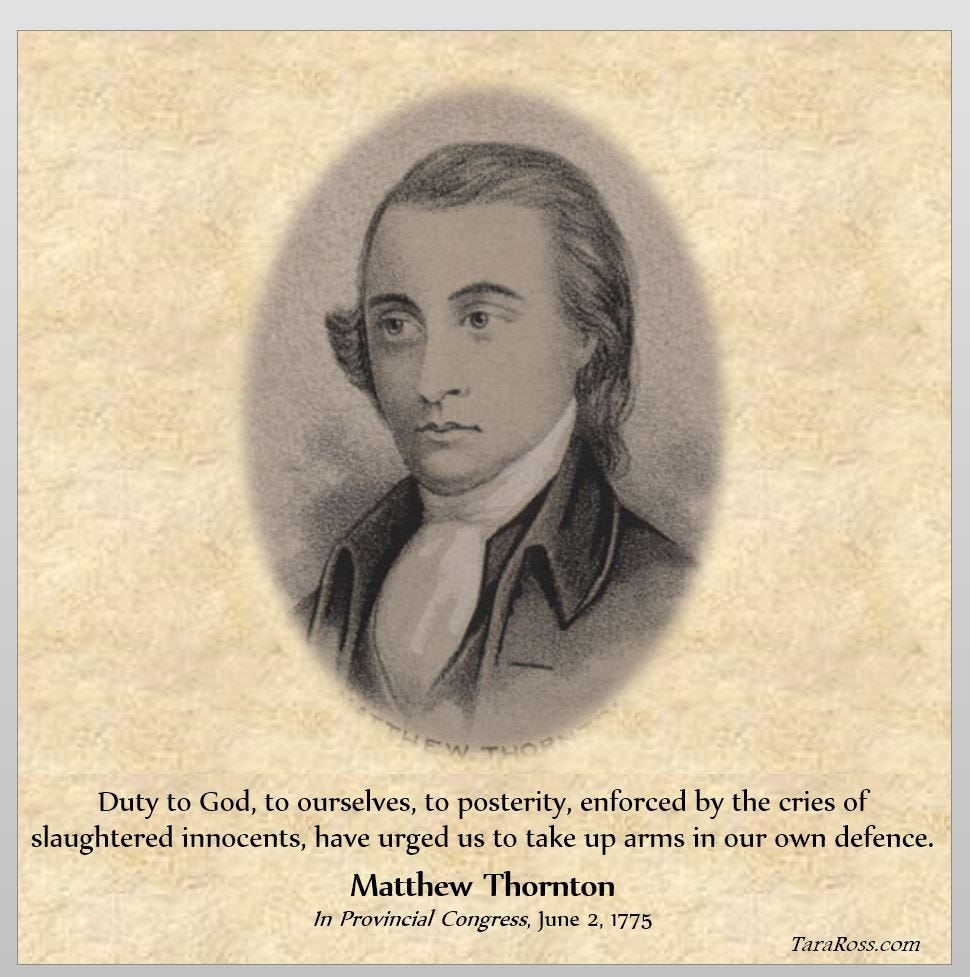TDIH: Matthew Thornton, Signer of the Declaration
He signed months after the Declaration was approved, even though he didn't have to.
At about this time in 1776, a signer of the Declaration of Independence is selected to serve in the Continental Congress. He wouldn’t be officially seated until November 1776—a full four months after the Declaration of Independence was approved.
He signed that document anyway.
Amazing. Why would he put his life on the line when he didn't have to? Thornton is among those who put their lives on the line for American liberty, yet we know relatively little about him.
We do know that Thornton was born in Ireland. His family immigrated here when he was young, probably between the ages of two and four. At first, they went to Maine, where they may have spent their first winter living in cramped quarters aboard a ship.
There was nowhere else to stay.
Needless to say, the Thornton family didn’t last too long in Maine. Within a few years, they had moved to Worcester, Massachusetts. Thornton got a good education there, then studied medicine in a neighboring town. He wouldn’t stay, though. By the 1740s, he’d established his medical practice in Londonderry, New Hampshire. Dr. Thornton was respected within his community: He was a doctor, a surgeon, an officer in the militia, and even a justice of the peace. He became a husband and a father.
Thornton was an early advocate for the Patriot cause, making himself “obnoxious to the [royal] governor,” as one early historian approvingly notes. By 1775, he had been appointed President of a Provincial Congress. “Duty to God, to ourselves, to posterity,” he told that Assembly, “enforced by the cries of slaughtered innocents, have urged us to take up arms in our own defence.”
The speech labeled him a traitor in the eyes of the King, but it was just one of the many ways that Thornton served in those days. He was seemingly everywhere, holding many offices and helping on many committees. Indeed, he was working so exhaustively that he apparently did not change clothes for 10 days straight in October 1775.
Thornton was finally appointed to the Continental Congress in 1776, but that appointment came late. The new delegate ended up arriving in Philadelphia months after the all-important July 1776 vote on independence. Presumably, no one would have thought anything of it if he’d failed to sign the Declaration. In fact, Thomas Jefferson remarked many decades later: “Why the signature of Thornton, of New Hampshire, was permitted so late as the 4th of November I cannot now say.”
Perhaps even more interesting, Thornton signed the document at a discouraging moment in the war. By November 1776, George Washington had been driven out of New York and was about to begin a long retreat across New Jersey. His miraculous midnight trip across the Delaware was still several weeks in the future.
“To sign the Declaration at that time was not the act of a seeker for notoriety,” one of Thornton’s descendants writes, “but that of a true patriot.” Thornton’s signature marked himself a traitor in a cause that must have looked increasingly impossible.
Thornton was surely disheartened when he was forced to resign from Congress not too long afterwards for health reasons: He’d had trouble bouncing back from a smallpox inoculation.
Fortunately, Thornton was able to recover, eventually. He saw American achieve her independence and lived out his life serving in various state capacities. When he passed away in 1803, he was remembered, simply, as “an honest man.”
Sources can always be found on my website, here.



"He was as an honest man". High praise for someone willing to risk his life for this country. Thank you Tara
A husband, father, doctor and patriot who's remembered as an honest man...that is a life well lived.
Thanks for sharing Matthew Thornton's story.